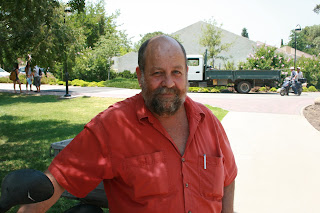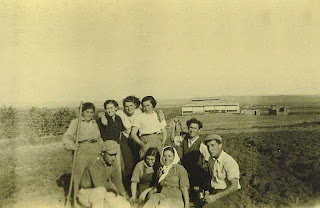
Jan 26, 2010

I only vaguely realized at the time how lucky I was to land at Kibbutz Shamir. During my months there, I heard rumours about the long days, rough conditions and general dissatisfaction of volunteers at other, less well-off kibbutzim. In 1988/89, when I lived in Israel, the whole movement was undergoing a profound financial crisis. The nation had emerged from several years of recession and hyper-inflation, and many kibbutzim were saddled with huge, oppressive debts. Cutbacks were necessary. Standards of living plummeted. Many members lost confidence in the movement, in their kibbutz, and left for Israel’s cities or immigrated overseas. Numerous kibbutzim struggled in this tailspin of economic, demographic and ideological decline.
Shamir wasn’t one of them. As volunteers, we were treated well. The kibbutz organized Hebrew lessons, educational sessions, and took us on Shabbat day trips and, twice a year, an extended five-day trip down to the Gulf of Aqaba and back. We were buffered from the economic anxiety experienced on many other communities. When I returned last June, I had the opportunity to interview Itzhik Kahana, who had been in charge of the orchards when I was a volunteer and is now serving as the kibbutz director. I include here an exercpted transcript of our talk about the past, present and future of Kibbutz Shamir.
What is the story of Shamir?
It was founded in December 1944 by the group Hashomer Hatzair from Romania. Most of the people were from two groups, of different ages, but the same movement. They knew each other well. They came to Israel and started building the kibbutz near Haifa. Gathering there, not building a kibbutz. They were in the port and in factories for about five years from 1939 until they were assigned to this spot because the other spot was not frontier enough. The movement gave them a few options and eventually they chose this one because there was completely nothing except rocks. That seemed to appeal to their frontier mentality.
How many people were in that first group?
About 160 people. About 40 to 50 left quite early. It was very harsh in the first few years. Other people joined the kibbutz, like my mother, who came out of Romania after the war, after she was in a British prison for six months for illegal immigration. After she got out—after she was sent here—then she met my father.
Was this the time of the “tower and stockade” movement?
A bit later. This land was bought by the Jewish National Fund. The main areas of farming in the beginning was on this hill, which is not much. For the first five years, they just took out stones out of the fields. There were fields for livestock, but the standard of living was very low. Nineteen-forty-eight made a big difference because all the Arabs of the valley left the villages and went to the mountains to wait for the Syrian army to kick out the Jews, which didn’t happen, so we got fields in the valley. All our agriculture is in the valley. The field-growing is in the valley.
On the Arab fields?
No. Some of them were fields, some of them were swamps we couldn’t use. Whatever they could use, they’d use. There was a lot of digging of canals. We had to spend a lot to make this land arable, so you could work on it. … We were living on agriculture basically until the beginning of the 1970s.
The post 1948 border [with Syria] must have added another level of tension.
Some people left because of it. It was too much for them. There used to be shooting almost daily. Just random. Sometimes it was more—mortars. That’s one of my first memories, the shooting.
In 1972 we opened the optical factory. The idea is to get work for the peple that are getting older and can no longer work in agriculture and it went on like this for about 10 years. It was bifocal lens. Then, at that time, the group that led the optical factory decided they needed something more sophisticated and decided to develop multi-focal lenses. It wasn’t easy. It took 10 [more] years.
So by the beginning of the ‘80s, there still was nothing there. We invested money into new technologies that we bought, in ’83, and then we bought another line, and another, and another. In the early ‘90s we finally had a breakthrough in the production of the multi-focal lenses. It’s climbing up.
But you’re still doing agriculture?
In the ‘90s, it started to go down as a main source of income and a main source of jobs.
And until the ‘90s?
There was a lot of people working there.
In the orchards?
Orchards, fish ponds. We tried almost everything. Cattle, sheep, pigs.
What was more successful?
The pigs were successful. But in 1963 the Knesset passed a law that Jews are not allowed to raise pigs, so we had to close it. The beef is very successful. It’s run by professionals who do it right, out of tradition.
In 1999 we accepted an investor in the optical factory. … Then, we got a partner in Shalag [fabric-making factory], which is a group of investors. That was the basic idea—that we go to public offering to capitalize on our success.
To raise money?
Basically, but first the money goes to the partners. Then it went to two things: the pension fund for the members, which was almost empty, and [our debt], which was very heavy and very annoying.
Was this a result of ‘80s financial crisis?
No, we just lived beyond our means. We didn’t run our financial things right.
Do you still run a volunteer program?
No. Farming went down… We now use a lot of Thai workers. The margin of profits is much lower and you cannot support volunteers in the system. Kibbutz members need all the jobs. Someone can work in the dining room for income. Before, it was a volunteer job.
Has the ideological vision of kibbutz movement changed? Are kibbutzniks still leaders in Israel?
Unfortunately not. We are one of the most hated groups in the country. We are not leading anymore, like it was in the army, in government, and we don’t have the pretenses to lead. We tried to. Whoever wants to be a politician goes into politics. Now we try to be successful in what we do, and eventually that helps you to lead. … The country is built; we don’t have to rebuild it. We have to find new challenges.

Jan 26, 2010

I stumbled across another academic paper, published in 2004, by the same authors, Richard Sosis and Bradley Ruffle, and based on their “100-shekel” field experiments. In “Ideology, Religion and The Evolution of Cooperation,” Sosis and Ruffle differentiate not just between kibbutzniks and city dwellers, but also between religious and non-religious kibbutzniks. “The emergence and stability of cooperation,” the authors write in the first line of their paper, “has been a central theoretical problem for those who study human social behaviour.” So, not Why can’t we get along? But rather, Why—given an apparent evolutionary impulse to look out for our own interests first—do we (or at least some of us) bother to cooperate at all?
Biologists have worked out explanations like “kin selection” to explain away cooperation within the me-first theory of natural selection. But Sosis and Ruffle focus on a variable unique to the human species: ideology. How does what we believe affect how we behave? And in the context of the Israeli kibbutz, does this effect vary between the secular kibbutzim that form the bulk of the movement and the smaller number of religion-minded communities? Did the deity make us do it?
What they discovered, based on who took out the fewest amount of shekels from the “common purse”, was that male kibbutzniks who regularly attended synagogue, where they perform public rituals, were most “cooperative”—or at least most committed to the sharing philosophy of the kibbutz. It makes sense. The cooperative communities that have endured the longest since the 19th century have been religious communes. But with religious kibbutzim (which tend not to be ultra-Orthodox), there isn’t the same pressure to stay on the community; you have the choice to leave if you want. It’s an interesting conclusion and poses challenges to secular communities who hope to cultivate the cooperative impulse in their members—and in future generations.
Even the many secular rituals of the non-religious kibbutzim—the shared Shabbat dinner, the public holiday celebrations and entertainments, the collective debates of the general assembly—don’t inspire the same sense of communal fraternity as sacred, supernatural, religious acts. As the authors write, “the bonds forged through a common secular ideological belief, even when supported by ritual activity, do not appear to create the long-term trust and commitment achieved within religious communities.”
I grew up Catholic, but shed most of those religious beliefs (thanks largely to biology class) by the time I reached university. And yet likely the most communal, cooperative activity I participated in (aside from the kibbutz) or at least witnessed was the volunteer work and church socializing my parents were involved in. I remain agnostic, borderline atheist—and too often disconnected from the community around me. Despite my secular beliefs, I can’t dismiss outright the religious impulse and even (despite its blood-soaked history of repression) the Catholic (or any other) church.
Ultimately, I hope that some other, less-toxic, less-supernatural, more-earthbound ideology might bind us together. (Perhaps the “eco-spirituality” that has pissed off the Vatican in James Cameron’s Avatar—and that is at the core of the eco-village movement, which has inspired several kibbutzim in Israel, too.) But Sosis and Ruffle’s research suggests that secular ideology—even wedded with Kumbaya-ish, treehugging, circle-dancing group-building rituals (been there, hugged that)—won’t lead us away from our own ingrained self-interest as much as a belief (or perhaps a fear) of a Higher Power keeping track of how many shekels we take from the collective envelope.
Jan 19, 2010
I’ve been enjoying my new tenure as a research fellow, for the next six months, at the Centre for Co-operative and Community-Based Economy (formerly, the B.C. Institute of Co-operative Studies). Every Friday, at 10 am, the staff, my fellow fellows and anyone else interested in what goes on here gathers for tea and conversation. (If you’re on campus, you ought to come by!) On a recent Friday, talk turned to the intriguing results of the socio-economic experimental “game” called “Ultimatum”.
In Ultimatum, two players must decide how to divide a sum of money (say, $100). The first person makes an offer; the second person can either accept or reject that offer, but if he or she rejects it, both players get nothing. It’s a one-offer deal. There is no negotiating.
The rational response of Player #2 should be to take whatever is offered by Player #1—it’s better than squat. However, in practice, many players will reject offers of 30% or less. Why they would take nothing rather than a little is one question. Why Player #1 is such a Scrooge is another—although, at least in pure economic science, players are acting “rationally” (i.e., in their own best interests) if they low-ball their compatriot, who has little leverage beyond accepting or rejecting the offer. Further studies have shown variations based on culture and gender: women behave more cooperatively, apparently, and are more likely to propose an even split.
Later, I came across a brief article in the New York Times Magazine annual Ideas issue that described a “drunken Ultimatum” experiment, in which imbibers at a bar were asked to play. They were even less likely to take anything less than a 50:50 split, suggesting that short-term revenge (or a sense of injustice) rather than long-term strategizing was behind this seemingly irrational behaviour.
Of course, after learning about Ultimatum, I immediately wondered: W.W.K.D.? What would a kibbutznik do?
I wasn’t surprised to learn that someone had already answered this question. Because of its unique communal set-up and voluntary membership, the kibbutz is one of the most intensely studied communities in the world, generating thousands of academic studies over the years. (I can only imagine what it must be like to be kibbutz-born identical twins, one raised there and one raised elsewhere—you’d be the ideal choice for every social science, nature-vs.-nurture experiment on the planet!)
While they didn’t use Ultimatum, Bradley Ruffle and Richard Sosis deployed a similar experiment to compare the level of co-operation of kibbutzniks (taken from relatively well-off, still-traditional kibbutzim) between fellow (but anonymous) kibbutz members versus “outsiders” (i.e., likely townsfolk). To simplify, the two players were told that an envelope held 100 shekels and they could take as much or as little as they wanted, but so could the other mystery player. If what the two players took totalled more than 100, then they would receive nothing. If it totalled less than 100, then what remained was multiplied by 1.5 and divided equally between the two players, plus they could keep whatever they had removed originally. The idea is to distinguish motives for individual gain (i.e., taking a lot and hoping your opponent takes a little) from those of collective gain (i.e., taking nothing or a little, knowing that what remains will be redistributed fairly with dividends).
The 2006 paper documents some surprising results. When faced off against another (unknown) kibbutz member, kibbutz subjects showed a willingness to behave cooperatively and only take a little from the envelope. When matched with an “outsider”, they behaved exactly as other subjects in the control group of non-kibbutzniks and were tempted to take more from the envelope. (Sociologists describe this as an example of “in-group bias”.) Equally intriguing, the longer that someone had lived at a kibbutz—i.e., if they were a born and raised kibbutznik versus a new member—the more likely they were to behave less rather than more cooperatively. New members—at least those who choose to join the still-traditional kibbutzim (the experiment was done in 2000, before the acceleration of privatization)—tend to be more ideological in their communalism than existing kibbutzniks.
As the co-authors write in their conclusion:
Despite the promise of a universally cooperative group, kibbutz members cooperate more with members of their own kibbutz than with city residents. What is more, when paired with one another, kibbutz members and city residents exhibit identical levels of cooperation. In this sense, kibbutz members may be said to be conditionally cooperative individuals. Our findings attest to the strength of the psychological foundations of in-group-out-group biases, in spite of a society’s efforts to train its members otherwise. Even members of this once idyllic, voluntary, cooperative community do not treat all individuals alike. Instead, they appear to form expectations concerning others’ degree of cooperation and reciprocate in kind.

Jan 18, 2010
If the dining room is the centre of communal life of the kibbutz—where gossip is traded over meals and decisions debated at general assemblies—then the volunteers’ bar (or “Volly Bar”) was the hub of volunteer life, for better or worse, during my tenure at Kibbutz Shamir. Every Friday evening, after Shabbat dinner, most of the foreign volunteers and a handful of the younger kibbutzniks would gather in the ramshackle cabin to drink too much and get to know each other. There was much craziness and camaraderie, but also some serious sharing and learning, too—at least for a kid from the suburbs of Ottawa, encountering for the first time people of my own age who were living through the geopolitical dramas of our age, rather than just reading about them in the newspaper. My first bar night on Shamir was a revelation.
Thurs. Oct. 27 [1988]
I don’t think I could begin in my awkward writings to do justice to the events of the last evening, but I must give it a try anyway.
I spent most of the night pulled up at a stool at the volunteers’ bar, quaffing “Goldstar” beers (only 60 agora for a pint—that’s about 2 pints for a Canadian dollar) and chatting with other volunteers. The beer was surprisingly good, relatively light tasting (I think it is 4.8% alcohol) but not like American piss-water beer.

Paul, a South African, and I exchanged stories on a number of topics and common interests including music (he likes Pink Floyd, The Doors, The Grateful Dead, Lynyrd Skynyrd among others as well as despising the throbbing disco music that is apparently played continuously at the bar), sports (he was interested about the Wayne Gretzky trade and how the Oilers were faring), politics (he knew a great deal about the upcoming American and Canadian elections), and travelling (he and a friend had spent 4 months driving across North America in a van).
The most fascinating conversation of the evening, I was just a mediator in. Ali, a young Arab living in an area of the Golan Heights captured from Syria by Israel during the Six Day War, and Paul took turns questioning each other and discussing the tense situations in their respective nations. Paul feels that change is a necessity in his homeland of South Africa, but a slow change, one that he says is already in process, not the violent revolution proposed by Nelson Mandela whom Ali said he respected greatly. Paul does however feel that Mandela should be released as he could cause more damage to the government by becoming a martyr in prison than he could as an old man with his freedom. Ali says, despite living in Israeli territory, he still considers himself a Syrian, though he doesn’t seem to harbour any resentment for the Israelis, as he works beside them, picking fruit for the kibbutz.

